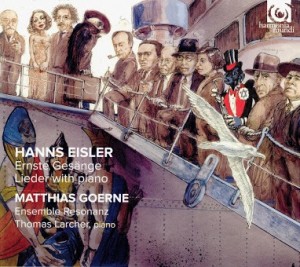 De Oostenrijkse componist Hanns Eisler (1898-1962) heeft altijd een voorliefde gehad voor vocale muziek, waar ‘de muziek de inhoud van de tekst volgt’: zoals hij het zelf verwoordde. Teksten met een maatschappij kritische kijk, die vanaf 1927 geschreven worden door zijn vriend Bertold Brecht (1898-1956), nadat Eisler naar Berlijn was verhuisd in 1925.
De Oostenrijkse componist Hanns Eisler (1898-1962) heeft altijd een voorliefde gehad voor vocale muziek, waar ‘de muziek de inhoud van de tekst volgt’: zoals hij het zelf verwoordde. Teksten met een maatschappij kritische kijk, die vanaf 1927 geschreven worden door zijn vriend Bertold Brecht (1898-1956), nadat Eisler naar Berlijn was verhuisd in 1925.
English version below
De cd opent met zeven ‘Ernstige Gesänge‘ die Hanns Eisler schreef eind 1962, een paar maanden voor zijn dood. De liederen zijn gecomponeerd voor Instrumentaal Ensemble en bariton waarin Eisler terugblikt op de na-oorlogse periode (hij vluchtte in 1933 voor de Nazi’s naar de V.S.). Gedragen liederen over hoop, geloof en heimwee waarbij de tekst, soms woordelijk, muzikaal wordt vertaald. De veelgebruikte chromatiek geeft deze muziek een extra bewogen karakter, prachtig ingetogen vertolkt door de bariton Matthias Goerne (foto/1967). Een zanger die als een kunstenaar de muziek voordraagt, muzikaal vertelt met een groot inlevingsvermogen. Hij heeft een warm en rond timbre en een sympathieke dictie die bij dit soort muziek onmisbaar is. Iets soortgelijks gebeurt in de Lieder mit Klavier waarin Goerne begeleid wordt door pianist Thomas Larcher. Op teksten van o.a. Bertolt Brecht start Eisler begin ’40-jaren het Hollywooder Liederbuch, uiteindelijk met zo’n 50 composities (veertien op deze cd). Neo-Romantische muziek doorspekt met chromatiek, abrupte modulaties en aangepaste harmonieën. Speerpunten die steevast terugkeren in Eisler’s muziek. Alhoewel, piano sonate op.1 (ook op deze cd) stamt uit zijn beginperiode, in de tijd dat hij les kreeg van Schönberg, begin 20-er jaren en atonaal componeerde. Een bijzonder contrast naast de ‘Ernstige Gesänge‘ en het ‘Hollywooder Liederbuch’ waaruit blijkt wat voor ’n geweldige componist Hanns Eisler is geweest. De cd sluit met het bekende ‘Solidaritätslied’ dat opent met de tekst: ‘Vorwärts und nicht vergessen…’ (‘Voorwaarts en niet vergeten…’). Dat is na iets meer dan vijftig minuten Hanns Eisler ook niet zo moeilijk!
English version
The composer Hanns Eisler (Austria 1898-1962) always had a predilection for vocal music, ‘where the music follows the lyrics’: he used to say. Critical lyrics about the society, written from 1927 by his friend Bertold Brecht (1898-1956), after Eisler moved to Berlin in 1925.
The cd opens with seven ‘Ernstige Gesänge‘ (Serious Songs) written by Hanns Eisler at the end of 1962, a few months before he died. These songs are composed for Instrumental Ensemble and baritone in which he looks back to the post-war period (he fled for the Nazi’s to Amerika in 1933). Solemn songs about hope, believe and nostalgia in which the music follows the lyrics exactly. The use of chromatic melodies gives the music a special character, beautifully sung by Matthias Goerne (1967). A singer who performs like an artist, by singing the musical story with a lot of empathy. He has a warm and round timbre with sympathetic accent which is indispensable in this kind of music. Like we hear in the Lieder mit Klavier (Songs with piano) in which Goerne is accompanied by pianist Thomas Larcher (photo). In the beginning of 1942 Eisler started writing for the Hollywooder Liederbuch, together with Bertolt Brecht he wrote about 50 songs (fourteen on this cd). Neo-Romantic music larded with chromatics, abrupt modulations and adapted harmonies. Spearheads which you always find in Eisler’s music. Although, his piano sonate op.1 (on this cd) is written in the begin period, in the 20’s when he was educated by Schoenberg and composed atonal pieces. This in sharp contrast with the ‘Ernstige Gesänge‘ and the ‘Hollywooder Liederbuch’. Together they show the wonderful skills of the great composer Hanns Eisler. At the and of the cd we find the famous song ‘Solidaritätslied’ that opens with the lyrics: ‘Vorwärts und nicht vergessen…’ (‘Keep on going and don’t forget…’), which is very easy after more than fifty minutes Hanns Eisler!
Matthias Goerne/Ensemble Resonanz/Thomas Larcher: Hanns Eisler – ‘Ernste Gesange’ – ‘Lieder with piano’- ‘Sonate op.1’ (Harmonia Mundi)
© Mattie Poels.

Geen reacties